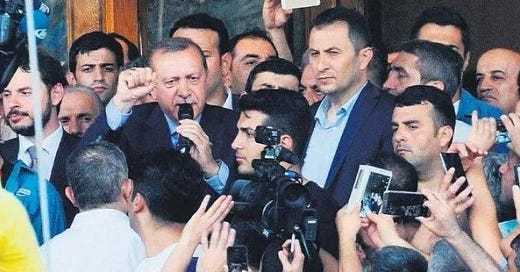Today is July 15, 2024 - the eighth anniversary of the coup attempt in Turkey. It’s a national holiday now, our country’s “second war of independence.” I guess that makes Erdoğan our second founder.
It just so happens that over the weekend, the United States was also confronted with an act of political violence against its executive branch: the assassination attempt against Donald Trump.
If you’ll indulge me, dear reader, I’d like to reflect on these two events together. Though obviously different in scale and scope, I think the two events have a similar resonance.
About half of people in Turkey are opposed to Erdoğan’s presidency, myself among them. Most of us believe that his rule has not only been deeply corrupt, but also corrosive of the foundations of Turkey’s Republic.
So what should we do when someone comes and tries to take it away from him? Is Erdoğan’s enemy our friend? On the night of July 15, the answer was no. Contrary to Erdoğan’s claims in following years, the entire political spectrum united against the putschists on that night.
Turkey is no stranger to coups, but this was different. As destructive as far-right politics was, it did have a broad base in society. Erdoğan was repeatedly reelected, even if it was in increasingly unfair ways. The task of political opposition in Turkey was to build a broad-based coalition against him before it was too late. The coup would have robbed the country of that opportunity.
There’s a lot we don’t know about that night, and probably never will. The coup was badly planned and poorly executed, but it probably could still have done irreversible damage. There was a point when Erdoğan’s jet and several putschist F-16s were circling Turkish air space at the same time. What if the putschists had shot Erdoğan down? The Gülenists, an Islamist cult formerly allied to the AK Party, were almost certainly behind the coup. They would have taken over, and might just have been able to secure a foothold on power. The country would have divided into collaborators and resistance forces. We would probably have entered a period of prolonged political violence, perhaps even a civil war of some kind.
That didn’t happen of course. The coup failed, and Erdoğan and his people embarked on sweeping purges and cemented their regime. And as awful as that continues to be, things would probably have been far worse if the coup had succeeded.
I had similar thoughts about the assassination attempt on Donald Trump. The shooter fired with an AR-15 from about 400 ft (122m) away. If his bullet had flown an inch to the right, Trump’s brains would have been splattered across the front row of MAGA hats. On live TV. What would have happened then? The federal government would no doubt launch a sweeping investigation. But would Trump supporters have believed a single word coming from them? I can see some militias in America’s deep-red districts trying to take matters into their own hands. I’m not sure it would have sparked another American civil war, but we’d almost certainly see much more political violence.


These incidents of acute political violence invariably help far-right leaders, so much so that some people speculate whether they’re false-flag attacks. I doubt that’s the case, but in our two cases, the leaders have fed the danger. Erdoğan injected the Gülenists - who were his allies at the time - into state institutions. Trump has encouraged a culture of violence around him.
Both also had an instinct for confronting the violence and creating a spectacle of it. Erdoğan struck a heroic pose on coup night, inspiring fierce resistance among his supporters. Trump got up from the podium, and surrounded by a meat shield of secret service agents, he stuck out his fist and shouted “fight! fight! fight!” to the crowd.
That’s the spirit I saw on the streets of Ankara on July 16. People were flush with the ecstasy of a near-death experience. They felt like they had survived the worst that the enemy could throw at them, and were now invincible. Surely history would now open up in front of them.
That’s probably how the MAGA crowd now feels. Their leader has survived. The election is just peanuts to them now. It’s not good news for the Democrats.
But I guess part of the lesson here is that it can always get worse. Far-right leaders make politics more violent, but the country still needs them to survive and keep the violence bottled up. The alternative is simply too terrible to contemplate.




"Is Erdoğan’s enemy our friend? On the night of July 15, the answer was no."
The similarity in political sentiment between the two events is striking. The collective anticipatory energy and hubris surrounding both events are the most fear-inducing factors.